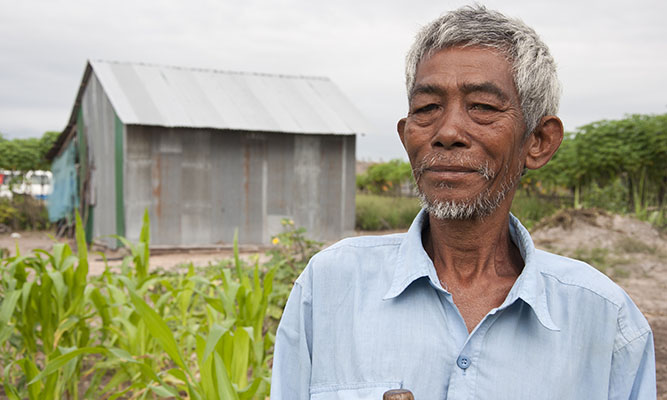Aoral District – The livelihood of 400 landless and land poor families who settled in on the new land granted by the government under its Social Land Concession Project (SLC), funded by Japan Social Development Fund (JSDF)/World Bank, were significantly improved over the past two years.
 |
 |
Mr. Svay Ben, one of the land recipients who moved to the new land in June 2012, proved an improvement in the living conditions of most families in terms of food security and nutrition in the newly-established village, named “Prey Thom” in Reaksmei Sameakki commune of Aoral district in Kampong Speu province.
Mr. Ben, 64, has had a very challenging live. He has 13 children. Three of them passed away. His family struggled to live without possession of land for years. To subsist, members of the family sold their labors across the province, while some other migrated for jobs elsewhere.
But, now Mr. Ben is no longer concerned about having no land to live and for cultivation. Under the SLC project, his family was granted a plot of brushy land sized 30m by 40m for residence and a brushy land of 1.5 hectares for agricultural purpose.
On the new land, he grew several kinds of vegetables and fruit trees on part of the residential land and grew rice on half of the agricultural land which was already prepared. Because he lacked labor force and money to clear brushes, the remaining half was left idle.
From month to month, he benefited little by little from his land and enjoyed his new life. He said late last year his paddy field yielded some 600kg of unmilled rice—the first time he benefited from his own land. Though the yield was small, it helped address the basic need for his family to some extent. “If the remaining land is prepared and I can grow rice all over the total land area, I will have some surplus for sale next year,” he said.
“My new life is much more convenient and better. Now, I have land for growing crops,” he said, adding that every day he got up early in the morning to work on his vegetable garden. After that he takes the 2 km walk to his farming land.
“Previously, I am worried every night and day about having no land. But, now I am worried about how to make best use of the land for improving my family’s livelihood,” Mr. Ben said.
Lack of water and distant markets are major challenges of all villagers in Prey Thom. Next year, he plans to raise chickens and pigs, and grow lemon grass—a drought-resilient crop. However, he is very optimistic that the land will bring his family a better future, he said.
He is grateful for the overwhelming support he received from LWD and the involved donors.

